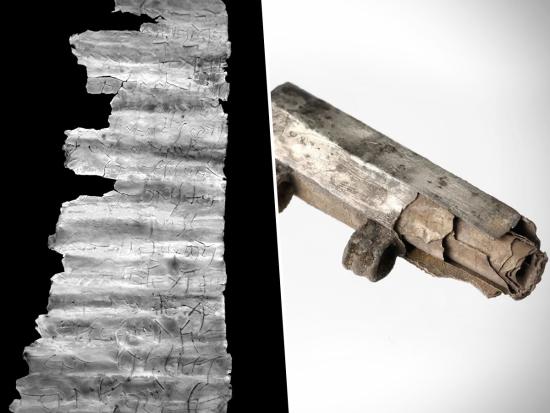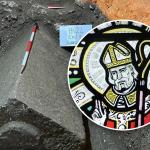
Archaeologists in Germany have announced the discovery of an ancient amulet that could be the earliest evidence of Christianity uncovered north of the Alps. The amulet was first discovered in 2018 in the Roman burial site of “Heilmannstraße” cemetery in Frankfurt Germany. The amulet contained a third century silver Christian scroll with 18 lines of Latin written on it. The scroll was too fragile to be unrolled, so researchers used a series of digital scans to make a model of what the scroll contained. The amulet contained a prayer, which was translated by Prof. Markus Scholz of Frankfurt’s Goethe University and has been included below. Some words remain unclear and are marked with a question mark, according to The Times of Israel:
“(In the name?) of St. Titus./ Holy, holy, holy!/ In the name of Jesus Christ, Son of God!/ The lord of the world/ resists to the best of his [ability?]all seizures(?)/ setbacks(?)./ The god(?) grants well-being Admission./ This rescue device(?) protects/ the person who surrenders to the will/ of the Lord Jesus Christ, the Son of God,/ since before Jesus Christ/ bend all knees: the heavenly ones,/ the earthly and the subterranean, and every tongue confess (to Jesus Christ).”
There are several things about the scroll that make it unique. Researchers have dated the scroll from somewhere around 230 to 270 AD, making it at least 50 years older than the oldest previously found texts in that region. Secondly, the fact that the scroll is written in Latin is “unusual for the time,” according to Scholz and that, “Normally, such inscriptions on amulets were written in Greek or Hebrew.” Another interesting characteristic of the amulet is that it is “purely Christian,” during a time and in a place that would have still been mixed with various faiths, making references to pagan or Jewish elements common. Such a singularly Christian prayer reveals the bearer of the amulet to be “a devout Christian.” Being a devout Christian would be unusual for the time given that, if the dating of the amulet is correct, the region would have been under Roman rule during the time when Christianity was still outlawed and Christians faced great persecution.
If the dating of the amulet and scroll is correct, it could mean big changes for the timeline of Christianity north of the Alps. “Assuming that the reading and the dating are correct, we would have here an early Christian amulet, written in Latin, and found in a remote town on the northern edges of the Roman Empire,” said Prof. Gideon Bohak, of the Department of Jewish Philosophy and Talmud at Tel Aviv University. “It will force us to turn back the history of Christianity in Frankfurt and far beyond by around 50 to 100 years. The first Christian find north of the Alps comes from our city,” said Frankfurt mayor, Mike Josef. “We can be proud of that, especially now, so close to Christmas.”

